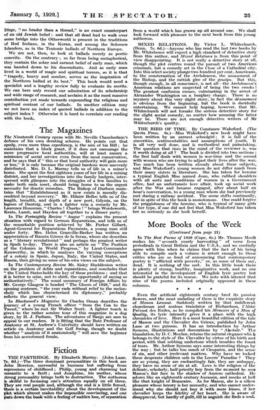The Magazines
The Nineteenth Century opens with Mr. Neville Chamberlain's defence of his own derating scheme. He points out that equity, even more than expediency, is the aim of his Bill ; he maintains that a block grant, if it does not encourage the more progressive local authorities, will at least ensure a minimum of social service even from the most conservative; and he says that if " this or that local authority will gain more or less,", it is only because the original burdens were unevenly distributed. Mrs. D. L. Murray tells us of life in a miner's home. She spent the first eighteen years of her life in a mining district, and her investigations into the family budgets, inter- spersed with glimpses into the struggles of a few families to make both ends meet, should bring home to us the urgent necessity for drastic remedies. The Bishop of Durham main- tains that "Establishment as it now exists is morally dis- credited beyond recovery." Mr. Hilaire Belloc tells us of the length, breadth, and depth of a new port, Gdynia, on the lagoon of Dantzig, and in a lighter vein a comedy by Mr. Laurence Houseman, " Charles ! Charles ! "brings Wordsworth, Keats, Lamb, and Haydon all together to a dinner party.
In The Fortnightly Review " Augur " explains the present situation with regard to German Reparations, and tells us of the remarkable position achieved by Mr. Parker Gilbert, Agent-General for Reparations Payments, a young man still under forty. Mrs. Helen Granville-Barker has written an appreciation of Ramon Gomez de la Serna, whom she describes as a " literary revolutionist " and perhaps the greatest writer in Spaih to-day. There is also an article on " The Position of the Colonies in World Progress," by Lieut-Commander Kenworthy, in which he analyses the varying conceptions of a colony in Spain, Japan, Italy, the United States, and Russia, then giving us some of his own views on the subject.
_ In The Contemporary-Review Mr. Sisley Huddleston writes on the problem of debts and reparations, and concludes that ``. the United States holds the key of these problems ; and that it is better to seize, not to shirk, the opportunity of saying so authoritatively." The usual summary of Foreign Affairs by Mr. George Glasgow is headed " The Gloom of 1928," and its opening sentence, " the year ends without relief to the melan- choly which has characterized its diplomacy," probably reflects the general view.
In .Blackwood's Magazine Sir Charles Oman describes the journey of a young French officer "from- the Coa to the Tweed," where he met Sir Walter Scott. A lighter touch is given to the rather sombre tone of this magazine in a dog story, by H. J. Parham. The adventures of Banjo are sure to appeal to our readers. It is fitting that the Bute Professor of Anatomy at St. Andrew's University should have written an article on Anatomy and the Golf Swing, though we doubt whether " analysis of it anatomically " will save the beginner from his accustomed foozle.






































 Previous page
Previous page